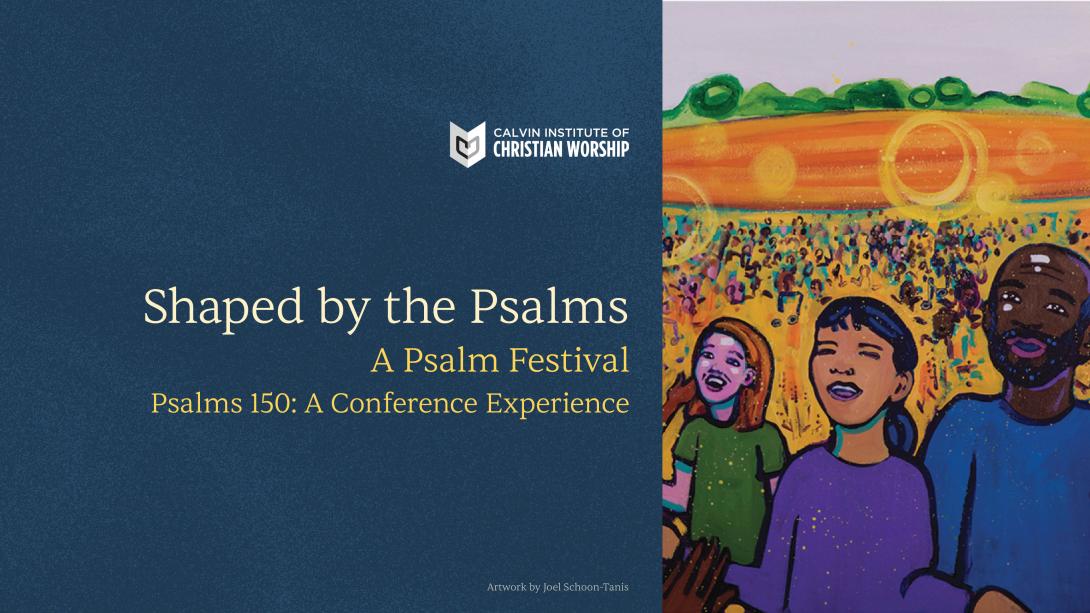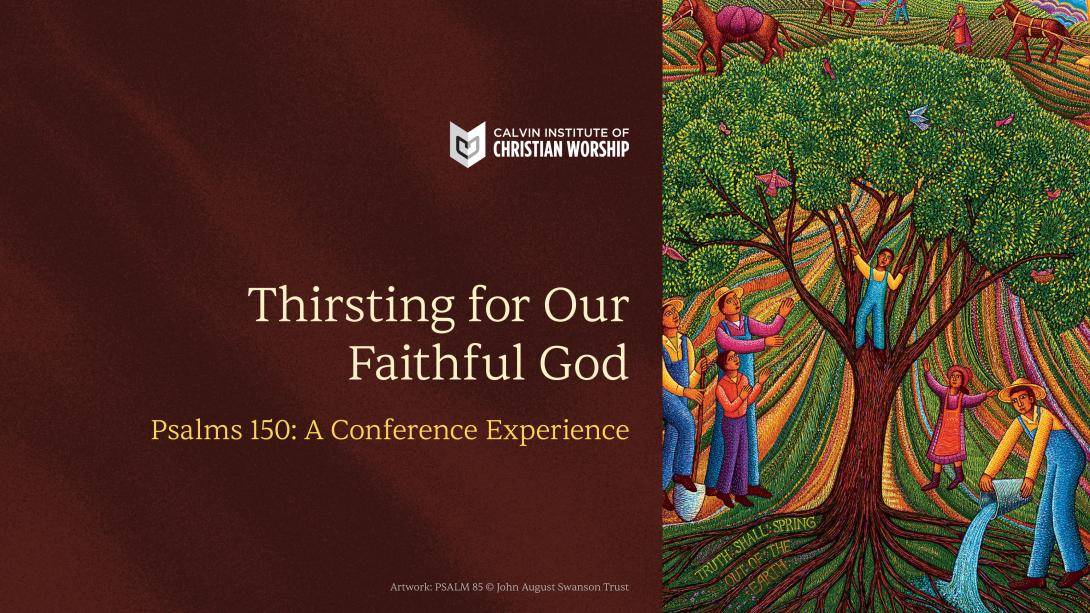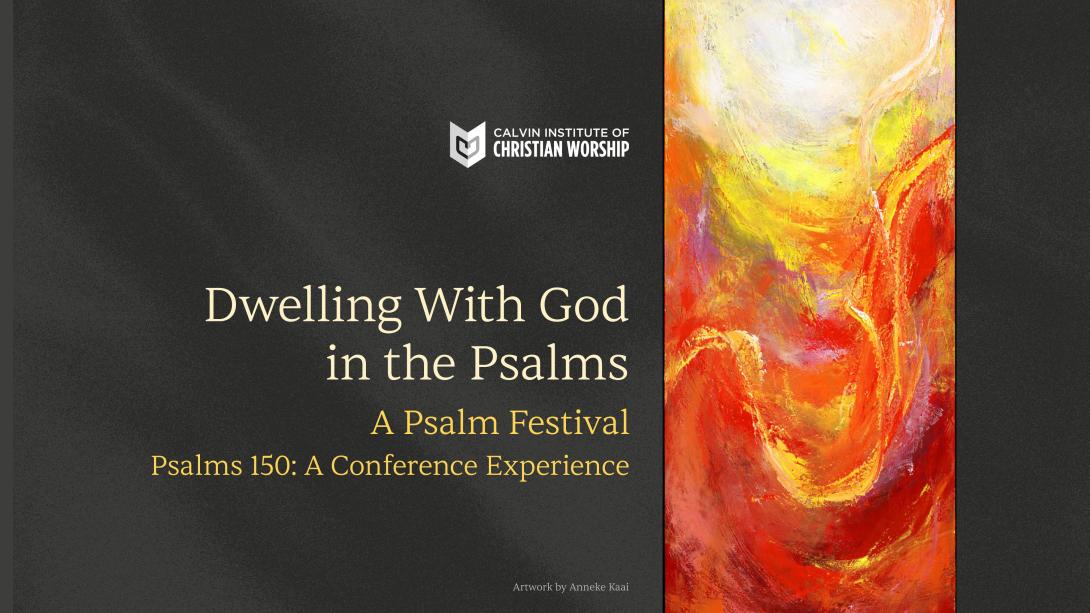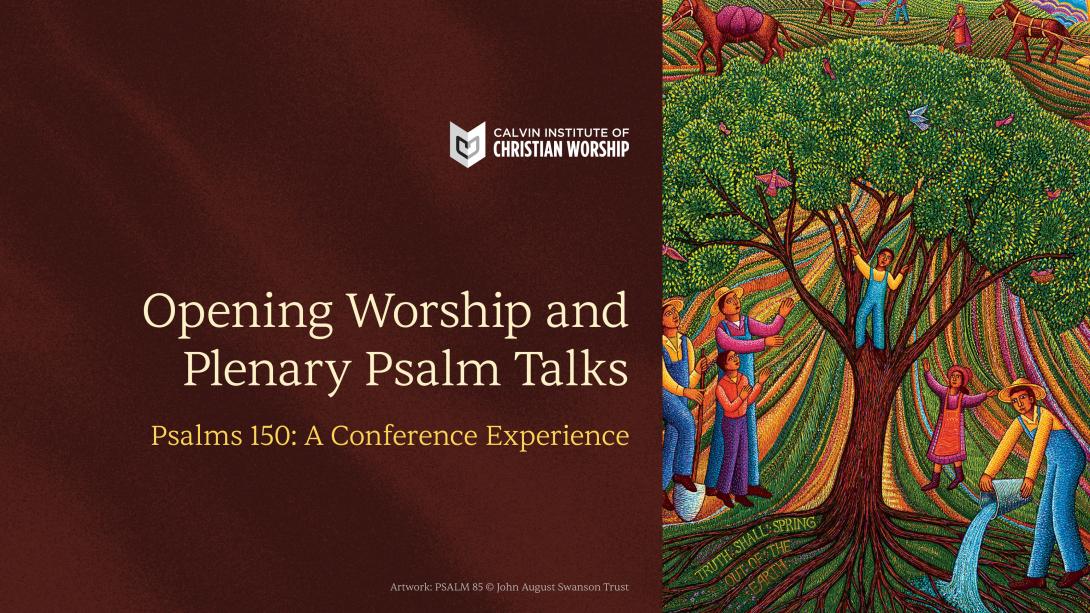Worship is contextual, including how a worshiping community perceives of time. Wise is the worshiping community that acknowledges these cultural differences and designs worship services that are sensitive to them.
This presentation was given as part of the Vital Worship Grants Colloquium held at Calvin College on June 24, 2015.
Mark Charles: My father is Navajo; my mother is American of Dutch heritage. And in the Navajo culture you always introduce your four clans. So my mother's mother is American of Dutch heritage. So in Navajo I say “Tsin bikee dine’,” which literally means ”The Wooden Shoe People.” My father's mother is tó’aheedlíinii, which is the Waters That Flow Together clan. My mother's father is also Tsin bikee dine’, and my father's father, my fourth clan, is tódích’íi’nii, which is the Bitter Water Clan, one of the original clans of the Navajo people.
About twelve years ago, I was living actually at Rehoboth, which was a ministry of the Christian Reformed Church to the Navajo Indian people established well over a hundred years ago. And I was called to pastor a church in Denver called the Christian Indian Center, which was about a forty-year-old emerging church mission of the CRC that was ministering to the urban native community of Denver. And I got to my first council meeting at this church, and they said to me, “Our last pastor introduced us to the concept of contextualizing worship, and we would like you to lead us into that.” I said, “That sounds great. How do you spell it?” I really had no clue what they were talking about. And they said, “Well, there's a conference next month in Hawaii that we want to send you and your family to.” I said, “For nothing other than the sake of the gospel, I will pick up my cross and board the plane and spend two weeks with my wife and my son in Hawaii.”
So we got to Hawaii. We were at the World Christian Gathering of Indigenous Peoples. Native Indigenous peoples from all over the world, coming together to share, learn, encourage one another as they are learning what it means to be Indigenous and be Christian.
One of the challenges that most Indigenous Christians around the world are faced with is that, by and large, around the globe Indigenous people have been what I call and others have called “colonized by the gospel.” In other words, missionaries came in, and they didn't just tell us about this guy Jesus and what he had done and how he was related to the Father and what the Father wanted. They said, “Here's this guy, Jesus,” and in the North American context they said, “He really likes it if you worship him—actually, he demands that you worship him—in English. He demands that your services end before the football game starts. He demands that your sermons have three points and your buildings are square,” and all of these criteria. And so we were used, we were colonized by the gospel. We were brought into this faith through a process of assimilation.
And so we're at this conference—and I had been to multicultural conferences before, and I kind of knew what to expect. You have a praise band, a multicultural praise band, and one or two songs that are new, and by the end of the time everyone knows a song in Spanish and a song in some African language. But we got there, and every night they gave the stage to a different tribe. So one night we're doing the haka with the Māori. The next night we're doing the hula with the native Hawaiians. The next night we're doing powwow-style singing with Plains Indians from North America. And every night you feel really, really uncomfortable because it's a whole new way of worshiping. They didn't say one or two songs. They didn't say, You lead the song. No, they gave the stage each night to a different cultural group. And each night, I felt really awkward. I mean, have you ever seen the haka? . . . You have these native Māori men dressed in traditional garb, and they come up, and they're standing there, and they say, We would like to lead you in worship. And then [shouting and stomping] they do their haka. And if I'm watching Discovery Channel, this is cool, but I'm being led into worship, and this is freaking me out. And the longer you sit there, the more uncomfortable you are. But the longer you sit there, the more you realize this is actually what it should feel like coming into the presence of the Creator. It should feel awkward. We should want to run and hide. We should want to look at our watch and say, “Is this over yet?” We should want to say, “I don't understand what's going on” when you have the creation that has rebelled and broken and separated themselves from the Creator standing before his presence and seeing him in more of his fullness.
And so I came home from this conference completely invigorated, wanting to share and to bring this into our own community. Because on most reservations and on our reservations, one of the tragedies of being colonized by the gospel is that most of our services look like a midwestern church service from the 1950sor ’60s. Somehow we picked that moment in time, and this is what it means to do church. This is what it looks like. And so when you go into our church services, if you shut your eyes, except for the two or three songs we sing in Navajo you would not know where you were. And even when we sang in Navajo, you would hear songs like [singing] “Jesus, ayóó’áshó’ní.” What song am I singing? ”Jesus Loves Me.” Well, there's a problem with that, because Navajo is a tonal language, and the intonation of your voice affects the meaning of the words. But because we had to please the missionary, we had to sing songs that they knew what we were singing. And so we compacted our language to fit the English tunes. And so traditionally, even forty or fifty years ago, they had to read the songs in Navajo before they sang them. Because when they sang them, the people had no idea what they were saying. This is what happens when you have a culture that is put into boarding schools.
Does everyone know the history of boarding schools? When you’re put into boarding schools and you're punished for speaking your language, you're punished for practicing your culture. You don't give up your language; you don't give up your culture. You just begin practicing them when the teacher or the dorm parent is not around. So now your language becomes something dirty you do under the covers when you're talking with your friends in the dorm room late at night. It doesn't go away. It just goes into a darker place. So, unfortunately for many of our churches, the church is not where we go to worship God. The church is where we go to please the missionary. And that has a very deep and profound impact on how we come to worship.
Now, when I was a student in college—I went to school at UCLA, and my third year there I was asked to do a research project on anything we wanted as long as it had to do with higher education and ourselves. And by my third year in school, I realized that across all of my relationships, there was a level of tension in every single relationship that I had, and there was a perception that I was rude and I was I was not very responsible. And so I did my study on the Navajo perception of time and the impact this has on students coming off the reservation and studying in large universities. So to do this study, the first thing I had to do was to define the Navajo and the Western perceptions of time. The Western perception of time is fairly easy: It's linear, right? You have a starting point and an ending point, and as you move across the timeline, you pass certain events. Now, there's a rule in this linear perception of time, which is once you pass something, it's over. You're not allowed to go back. So this creates a tension in you, and so you don't want to miss anything. And so you make a schedule and you live your lives according to the schedule. So you have breakfast at eight, lunch at noon, dinner at five. You graduate high school by 18, college by 23, into your career and your family by your late 20s or early 30s. So it's this schedule that we live our lives on according to this linear time perception. So what's a midlife crisis? Well, you get two thirds through your life, you can't go back, so you buy a Harley, right? You haven't accomplished all your goals, but at least you can look like you've accomplished all your goals. This is the way the linear perception of time works. And so the way you communicate honor and value and importance in this linear time perception is you honor the schedule. So you show your boss that you honor the job by showing up on time. You show your teacher you honor the class by turning your work in on time. You show your spouse you honor the relationship by remembering the anniversaries on time. Did you ever remember the anniversary the day after? What happened? It was a nice couch, wasn't it? This even affects the way we worship. We honor God how? By getting to the service on time. This is the way you work within the linear perception of time.
In the Navajo culture, we have a circular perception of time. As you go around the circle, you still pass events. But once you pass something, if you pass something, you don't worry about it near as much. How come? It's going to come back around. So the way we organize our lives is not by making a schedule, but by completing a task. So you work on something not until a bell rings, but until you complete the task. And so the way we communicate honor and value in importance is not by getting there when something starts, but by staying until it finishes.
Now, if you think about that, that has huge implications on how we design our worship services. That has huge implications on how we come before the Creator of the universe. And so when I talk about multicultural worship, when I talk about bringing together different cultures, I find in America we often do what is our cultural value, which is the value of assimilation. And so even in our multicultural context, we try to take the least offensive, the most common denominator of each culture, and we pack them all into this service that is working within this linear structure or time frame because what we have in our cultures [is the] value of assimilation. We're a melting pot, right? But the value of assimilation is not in scripture. That's not something that God had for his people.
If you look even at the story in Acts 2, when God wanted to share what his Son did with all of creation, it happened that there were people from all over the world in Jerusalem, but they all spoke different languages. So God had to do a miracle. And he had a choice. He could either let everyone in Jerusalem understand Greek or Hebrew and establish a unified, assimilated language for the church. Or he could let his disciples speak the languages of the nations. Which did he do? He did the latter. The messier. The one that was going to ensure that there was going to be cultural conflict because now, by allowing his disciples to speak the languages of the nations . . . If you've ever done any work in language, you know there's no direct translation in anything, so you have to reframe things and rephrase things so they fit into the worldview of that culture and of that language. If you want to destroy a culture, the first thing you do is you destroy the language. And so God wanted to affirm the diversity that he created by allowing everybody to hear the gospel in their own language. And so God doesn't have a value for assimilation. He has a value for diversity. The church is not a melting pot. It's a mosaic where every piece is vibrant. Every piece is necessary.
And so when I went back to my church, we began thinking about: how can we begin to contextualize our service for our Navajo culture? And when you often get into conversations about contextualized worship, you go straight to the tools of your worship. Are we going to use a drum? Are we going to use regalia? Are we going to dance? Are we going to do all these other things? And I tell people, if we really want to contextualize our service, we have to talk about the structure of the service. Because if you talk to a traditional Navajo who was raised up in the traditional language and now is a Christian, and he's used to a three-day ceremony, and you tell him you've carved out two and a half minutes after the offertory for him to sing a solo, he's not going to know who to offend. Does he come in and offend himself by singing a song that's two and a half minutes long and doesn't make any sense to him? Or does he offend the congregation by singing the three-hour song that offends everybody who's listening to him because the service doesn't end? So if we really want to contextualize, we have to think about the structure of our service.
The challenge that we have is, as I’ve talked about, time perception over the past decade is most people don't think they have a time perception. They think they have a time truth. And we judge people based on what we understand the truth of time to be. So when I ask any community of color, “What’s . . . Latino time? What's Navajo time?”, what do they say? Universally, they say it means you're late, because what are we doing? We're judging the value of the circular based on the structure of the linear. So we really need to rethink— if we really want to contextualize our worship services, we have to think about what does it mean to truly allow the people of this culture to embrace what they do.
I'll end with this question. When I lecture in the seminaries, I love to ask the students the question “Who has ever been to a contextualized worship service? Who’s ever been to a contextualized worship service?” Usually one or two people of color or missionaries raise their hand. And I say, “So I can assume then, correct, that the rest of you worship in the synagogue on Saturday in Hebrew. Right? That's how Jesus did it. All of our services, almost every Christian worship service in the Western world has been highly contextualized. If Jesus walked in, he wouldn’t be mad, but he would definitely be confused. Why are we worshiping on Sunday instead of Saturday? Why is it set up like a lecture? Why do we always get out before the football game starts? It's not that it's a bad thing, but it's been highly contextualized for the values of Western culture. And so what Indigenous and other minorities are trying to do is to say we want to be able to have that same freedom. We want to be able to contextualize our worship so that we can come to God and we can go to church not to please the missionary, but to worship the God of creation. Thank you.





